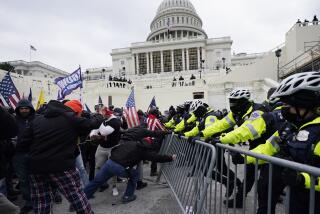U.S. Judge Voids Portion of Patriot Act as Illegally Vague
A Los Angeles federal judge has struck down a provision of the USA Patriot Act as unconstitutionally vague.
U.S. District Judge Audrey B. Collins, in an order made public Friday, said language making it illegal to give “expert advice” or “training” to foreign terrorist organizations is impermissibly imprecise.
At the same time, she handed the government a victory by upholding a broader provision of the law prohibiting individuals from giving “material support” to terrorist organizations.
Collins made it clear that her order, which enjoins the Justice Department from enforcing unconstitutional features of the law, applies only to those who brought the lawsuit, U.S. supporters of the Kurdistan Workers Party in Turkey and the Liberation Tigers of Tamil Eelam in Sri Lanka. The State Department has designated both groups as terrorists.
The plaintiffs say that they want to provide humanitarian aid to the two movements, including relief to Sri Lankans left homeless by last year’s devastating tsunami, but fear prosecution.
Justice Department spokesman Charles Miller said the government was pleased with Collins’ decision. “The judge’s ruling affects only one small aspect of the Patriot Act,” he said.
David Cole, a Georgetown University law professor who argued the case for the plaintiffs, also claimed victory, saying: “Judge Collins’ decision affirms that we must not sacrifice principles of free speech in the war on terror.”
Collins’s ruling was in part a replay of two previous decisions she handed down involving U.S. antiterrorism laws.
Four years ago, in a case involving the same plaintiffs, she threw out language in the Antiterrorism and Effective Death Penalty Act of 1996 that prohibited furnishing “personnel” or “training” to organizations designated as terrorist.
She issued a similar ruling last year in connection with language in the 2001 USA Patriot Act, declaring that it could be misused to curb constitutionally protected free speech.
Congress attempted to deal with Collins’ objections when it revised the Patriot Act in December. But in her 42-page opinion, the judge said legislators failed to clarify the meaning of “expert advice” and “training.”
Collins, however, rejected arguments by the Center for Constitutional Rights, a New York-based civil liberties group that represented the plaintiffs, that the act’s ban on material support to terrorist organizations was unconstitutional because it did not require the government to prove that a defendant acted intentionally.
Collins noted that the revised Patriot Act specifies it is illegal to provide such support to an organization “that one knows is a designated foreign terrorist organization or is engaged in terrorist activities.”
The judge indicated that her ruling does not affect other provisions of the Patriot Act barring donations of money, weapons, housing, expert technical or scientific knowledge, communications equipment or transportation to terrorist groups.
The suit was brought on behalf of five organizations and two individuals. They include the Humanitarian Law Project, headquartered in Los Angeles, which says that it wants to teach members of the Kurdistan Workers Party how to peacefully advocate for their rights as a minority in Turkey.
The pro-Tamil groups say that they want to provide expertise in political organizing as well as humanitarian relief to Tamil residents, especially those who live along Sri Lanka’s northeast coast, which was hard hit by the tsunami.
More to Read
Sign up for Essential California
The most important California stories and recommendations in your inbox every morning.
You may occasionally receive promotional content from the Los Angeles Times.










